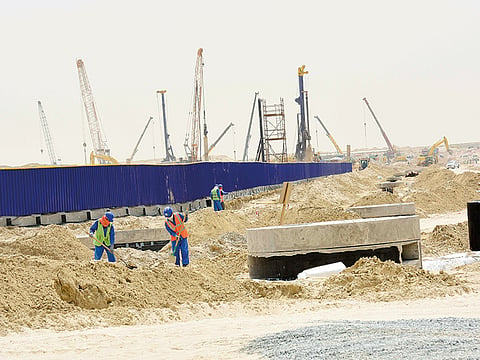UAE economy manages soft landing with improvements in public finance
A pick up in non-oil private sector economic activity is the key driver of economic growth

Dubai: The UAE economy is successfully managing a soft landing amid fiscal pressures on public finance resulting from persistent low oil prices, according to economists and analysts
“We continue to think that the UAE has managed a soft landing, with a less pronounced cycle than in 2008. We expect non-oil real GDP growth to have bottomed out as the fiscal drag eases and infrastructure activity picks up,” said Jean-Michel Saliba, Middle East and North Africa (Mena) Economist of Bank of America Merrill Lynch.
A gradual pick up in non-oil private sector economic activity in the UAE will be a key driver of economic growth in the country this year and next, but low oil prices and output will continue to be a drag on economic growth, according to the latest UAE Economic Update from Abu Dhabi Commercial Bank (ADCB).
“Our forecast deceleration in headline GDP growth in 2017 masks the gradual pickup in non-oil activity. We estimate that real non-oil GDP growth will strengthen to 3.1 per cent in 2017 and 3.3 per cent in 2018, up from 2.7 per cent in 2016,” said Monica Malik, Chief Economist of ADCB.
While the non-oil sector has seen visible improvement, this has not been able to fully offset the impact of low oil prices, implying a sharp decline in real GDP by about by a half from last year.
“We expect overall UAE real GDP growth of 0.9 per cent in 2017, from 2.2 per cent likely in 2016. The headline figure masks a likely contraction in the oil sector due to the Opec deal, but we see non-hydrocarbon real GDP growth picking up,” said Saliba.
Analysts say the non-oil economic acceleration in 2017 is largely due to a pickup in investment activity in Dubai alongside some external recovery. Expo 2020-related investment activity is driving project awards in Dubai both directly and indirectly. Dubai saw a 14.5 per cent increase in the value of project awards in 2016. These awards should translate into stronger investment implementation in 2017 alongside the strong awards in the first quarter of 2017.
Dubai leads non-oil activity
Construction projects have continued to dominate project awards, linked to two main areas such as Expo 2020 and real estate and hospitality. Expo 2020 projects include those linked to the site, including the main pavilion and the thematic areas. Dubai-led construction projects are again expected to drive project awards in the second half of 2017. This includes Dubai Creek Mall, which is expected to be tendered in the third quarter of 2017. A number of awards related to the oil and power sector are also expected, including a solar project in Dubai. There have already been signs of a pickup in awards in July and August versus the previous two months, including projects related to Deira Island. The award for the construction of the main section of the UAE Pavilion for Expo 2020 was made in early July, and the RTA has awarded a number of road projects serving the Expo 2020 site.
Dubai remains committed to fiscal prudence but deficits are likely to widen modestly. The Dubai government is likely to have recorded a small budget surplus in 2016. “We expect the fiscal balance to shift to modest deficits (1-2 per cent GDP) from 2017 onward as capex associated with the new airport, new metro lines and Expo 2020 come on line. The Dubai 2017 budget projects a deficit of $0.6 billion (0.6 per cent of GDP), but we think the presentation excludes interest payments on the Emirates NBD loan,” said Saliba.
The still supportive external financing backdrop and improved domestic liquidity support refinancing of Dubai government-related entities (GREs). Aggregate Dubai public sector debt appears to have stabilised in nominal terms, although it remains at elevated levels. Reflecting uneven progress among Dubai GREs, the stabilisation is however accompanied by a concurrent shift toward less transparent domestic sovereign borrowing from majority Dubai government-owned Emirates NBD bank.
Sign up for the Daily Briefing
Get the latest news and updates straight to your inbox



